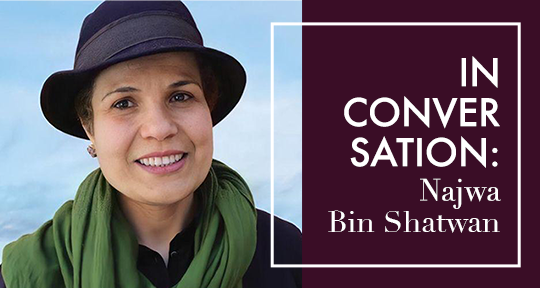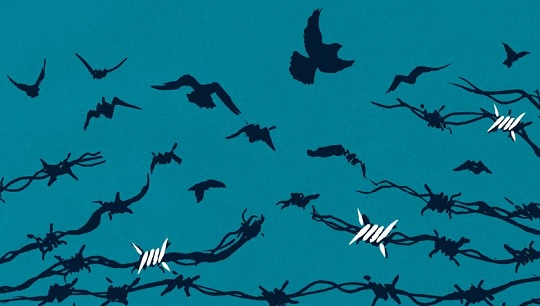Najwa Bin Shatwan is a Libyan academic and novelist—or so you will find written across the pages of many journals’ and publishers’ websites, alongside her stories in Arabic and their English translations. But she is so much more, as anyone who has had the pleasure of reading her works can attest to. Born in a land continually reeling with political unrest, she has been denied the privilege of free learning—such as of foreign languages—and suppressed and prosecuted for shedding light on the suffering of people past and present. Still, she weaves magic with words, painting vivid scenes with surreal imagery, and draws you into dialogue and contemplation by first making you smile.
The imagery used in her pieces is enchanting, which is perhaps not a surprise given how images drive her. Her novel The Slave Yards, which made her the first Libyan writer to be shortlisted for the International Award for Arab Fiction, was catalyzed from an incident wherein she saw a photograph of Benghazi at a friend’s place; the photograph compelled her to show the reality and horrors of the slave trade in Libya. While there have been attempts to shut her down—which have succeeded in making her emigrate to Italy—her oppressors have failed to silence a voice that incorporates the many people, dialects, values, and thoughts she embodies.
Her latest publication, Catalogue of a Private Life, is a collection of short stories translated form Arabic by Sawad Hussain, and it is a tapestry that incorporates many dualities of a people and their identity: their quirks and rigidity, their ready acceptance of bizarre circumstances and tunnel vision in regular circumstances, their warm humour and the dread of their situations. It won the 2019 English PEN Translates award, and I had the pleasure to talk to her about her life as well as the stories in this collection.
Chinmay Rastogi (CR): Your work has been a guiding light towards the suffering of people in Libya, but it also unveils the atrocities conducted by people of the region in the past, as in The Slave Yards. How difficult is it to stand on middle ground, to give both accounts through your writing?
Najwa Bin Shatwan (NBS): Writing in culturally thorny areas such as the Arab region is not easy, especially if the writer dismantles topics of social or political sensitivity—whether from the past or the present. It is easy for a book’s subject to incite conflict or escalate into a declaration of hostility. Our writing, which focuses on real matters, creates enemies, and such antagonism does not stop at a point of view that differs from what the writer’s. Rather, it may escalate into bloodshed or physical assault, simply because the writer presents a proposal that is different from the society’s vision, and is not in line with the prevailing ideology.
I felt the ferocity of this difference in my writing in terms of its social and political orientation, and with the spread of freedom of expression—which reached a chaotic peak with the emergence of social media—it became possible for those who disagree with a writer to inflame or incite public opinion against them.
Words are like gunpowder—they can ignite at any moment, and the type of writing that touches open wounds is not welcome; people prefer to proceed with their lives in denial, and believe that adopting a false mental attitude regarding many issues is better than getting into trouble.
As a writer, I work honestly and impartially, without complacency, and I feel the danger to my life, to my chances and fortunes in general. READ MORE…


